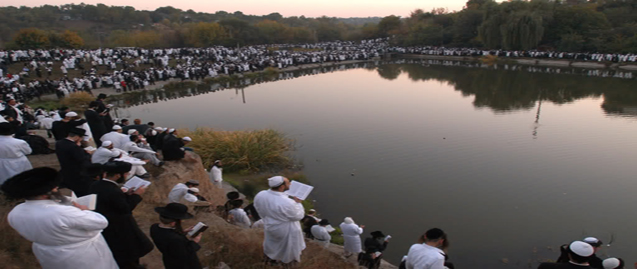For those who have studied in Yeshiva, just the sound of the word Elul is enough to send a chill down your spine. It is said that in the days of old, when the month of Elul was announced in communities throughout Europe (on the proceeding Shabbat), many would faint from fear.
If one takes a quick glance at the laws and customs pertaining to Elul, we learn we should recite more Tehilim, refrain from certain activities that although permissible – rely on certain leniencies, and various other serious and often difficult preparations for the approaching Day of Judgment.
However, most of us feel far removed from the seriousness of these days. Furthermore, the required preparations and expected “mood” may make us feel negative about these days. Is this the proper approach? What does Rebbe Nachman teach about how to repent?
All of the Jewish customs and feelings associated with this month are certainly praiseworthy and important. However, there is a general misconception related to these and the general concept of Teshuva (repentance) that should be pointed out.
Rebbe Nachman taught that depression and sadness are absolutely forbidden! The Rebbe was famous for saying, “It is a great mitzvah to always be happy.” But people forget that he also said, “It is a great sin to be depressed!” One must be extremely careful in insuring that any extra act or stringency be done with only happiness. Sadness and depression are the polar opposites of Teshuva (returning to God). But if this is so, how do we explain the examples of Elul seriousness above?
We must distinguish between broken-heartedness and depression. Whereas, depression is very negative, drawing one away from God, broken-heartedness is the true expression of a healthy Jewish heart. In fact, it is said that nothing is as whole as a broken Jewish heart. Jews of yore had a much easier time connecting with this expression and for this reason, we read about their many exulted Elul customs and feelings.
Although broken-heartedness is much desired and appropriate during these days, we must be very careful to realize that we can quickly fall into sadness. It is necessary to work every day not only at doing Teshuva, but also at remaining in a calm and joyful mood. True, the laws of Teshuva include making an accounting of our actions and repenting for our sins; however, the essence of Teshuva is simply returning to God from wherever we may be. This is not a mechanical process, where we simple call out our sins, or try to force ourselves to feel bad. Recognition of our mistaken actions is really a wakeup call, reminding us of areas in our spiritual lives that need some real fixing. This is where the true work lies.
YES, we should try to improve in these areas and accept doing some related extra things, but we must also realize this is a long process. We are only at the start. Even in the World to Come, we will constantly be doing Teshuva. Teshuva is our eternal healing process, not a depressing yearly bandage. (see Likutey Moharan, Lesson 6 for more details.)
Most of all, this should be viewed as a wonderful gift from God. He is calling out, informing us that He desires a healthy vibrant relationship with us. We need only take stock of ourselves! We should look at this as an amazing joyful opportunity; we are preparing ourselves for a very special relationship with the Master of the Universe. What could be better?
________
There is much written in the Breslover texts about the ideas of Teshuva & the month Elul. We present the following free resources to help you on your journey. Bon Voyage!


1 תגובות
Oh no. I’m doing the exact opposite of this. I thought Elul was a month where the enemy attackes you the most. I’ve been very depressed and sad this month. When I heard about Elul I though “oh my depression is a cause for this month.” Why am I feeling depressed in a month of joy? I believe in Hashem. I just feel like my faith has been drained out of me. Please respond back.